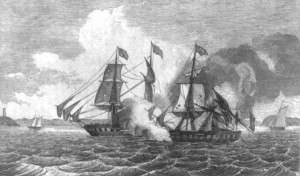[jpshare]At the outset of the War of 1812, the American Navy wasn’t considered much of a match for the British Navy. And the USS Enterprise was hardly anyone’s idea of a state-of-the-art warship. But she stunned and gladdened the nation with her capture of the H.M.S. Boxer.
At 85 feet in length, Enterprise carried just over 100 seamen, 14 cannon and two long guns.
As Teddy Roosevelt wrote in his history of the naval war, American brigs “carried far too many guns and men for their size, and not enough to give them a chance with any respectable opponent; and they were almost all ignominiously captured. The single exception was the brig Enterprise.”
On the morning of September 5, 1813, the Enterprise happened upon the H.M.S. Boxer, a similarly-sized British vessel that had been harassing ships off the coast of Maine and Canada. She was anchored near Pemaquid Point. For the next several hours, the two vessels maneuvered in the waters off Monhegan Island, readying themselves for the battle to come.
Along the shoreline, citizens gathered to see what they could as they became aware of the battle shaping up. By 3 p.m. Lieutenant William Burrows had the Enterprise bearing down on the Boxer. On the British ship, Commander Samuel Blyth ordered the ship’s flags nailed to the mast, demonstrating that he had no intention of striking his colors and surrendering, come what may.
The overloaded Enterprise had one striking advantage. Boxer had only a crew of 66 on board, leaving her with far fewer men to operate the guns and keep the vessel under control.
At 3 p.m., with superior aiming, the Enterprise damaged the Boxer badly. She lost a mast. And, she lost Commander Blyth, who was killed by a cannon shot.
Burrows, too, was mortally wounded, though he would live on to see the end of the fight. As the fighting progressed, four British sailors would abandon their posts, giving the Enterprise and even greater advantage. Within a half hour, the battle was over .
Shot through the hull multiple times and unable to maneuver, the Boxer surrendered. Blyth’s sword was taken to the American ship and presented to Burrows, who ordered it be returned to Blyth’s family.
On shore, it wasn’t immediately obvious who had won. Though Henry Longfellow would later make the battle famous in a poem, he likely saw very little of it, as it was so far distant.
When the H.M.S. Boxer was finally brought in to Portland Harbor by the Enterprise, the town learned the outcome. On September 9, both captains were laid to rest in Portland, side by side in a funeral that celebrated both of their heroism.


2 comments
Pemaquid Point — where my Blasdel/Blaisdell ancestors landed in 1635. But later in the 1600s they moved to the Boston area, so weren’t near Pemaquid Pt in 1813.
[…] on Britain’s Board of Trade, managed to obtain permission to settle a colony in what is now Maine’s Pemaquid Region. In trying to curry favor with the king, he naturally proposed calling this new colony Georgia. And […]
Comments are closed.